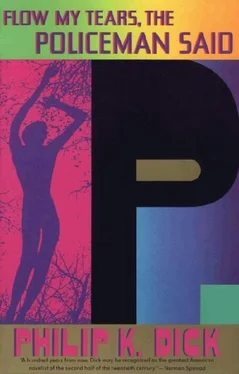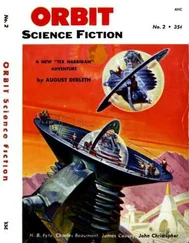“Which,” Herb said, “is too bad for Taverner.”
“Yes.” Buckman nodded. “Now consider this.” He paused a moment to quietly fart, then continued, “Taverner made his way to an ID forger, a run-of-the-mill forger operating behind an abandoned restaurant. He had no contacts; he worked through, for God’s sake, the desk clerk at the hotel he was staying at. So he must have been desperate for ident cards. All right, where were his powerful backers then? Why couldn’t they supply him with excellent forged ID cards, if they could do all this else? Good Christ; they sent him out into the street, into the urban cesspool jungle, right to a pol informant. They jeopardized everything!”
“Yes,” Herb said, nodding. “Something screwed up.”
“Right. Something went wrong . All of a sudden there he was, in the middle of the city, with no ID. Everything he had on him Kathy Nelson forged. How did that come to happen? How did they manage to fuck up and send him groping desperately for forged ID cards, so he could walk three blocks on the street? You see my point.”
“But that’s how we get them.”
“Pardon?” Buckman said. He turned down the lute music on the tape player.
Herb said, “If they didn’t make mistakes like that we wouldn’t have a chance. They’d remain a metaphysical entity to us, never glimpsed or suspected. Mistakes like that are what we live on. I don’t see that it’s important why they made a mistake; all that matters is that they did. And we should be damn glad of it.”
I am, Buckman thought to himself. Leaning, he dialed McNulty’s extension. No answer. McNulty wasn’t back in the building yet. Buckman consulted his watch. Another fifteen or so minutes.
He dialed central clearing Blue. “What’s the story on the Las Vegas operation in the Fireflash District?” he asked the chick operators who sat perched on high stools at the map board pushing little plastic representations with long cue sticks. “The netpull of the individual calling himself Jason Taverner.”
A whirr and click of computers as the operator deftly punched buttons. “I’ll tie you in with the captain in charge of that detail.” On Buckman’s pic a uniformed type appeared, looking idiotically placid. “Yes, General Buckman?”
“Have you got Taverner?”
“Not yet, sir. We’ve hit roughly thirty of the rental units in—”
“When you have him,” Buckman said, “call me direct.” He gave the nerdish pol type his extension code and rang off, feeling vaguely defeated.
“It takes time,” Herb said.
“Like good beer,” Buckman murmured, staring emptily ahead, his mind working. But working without results.
“You and your intuitions in the Jungian sense,” Herb said. “That’s what you are in the Jungian typology: an intuitive, thinking personality, with intuition your main function-mode and thinking—”
“Balls.” He wadded up a page of McNulty’s coarse notations and tossed it into the shredder.
“Haven’t you read Jung?”
“Sure. When I got my master’s at Berkeley—the whole poli sci department had to read Jung. I learned everything you learned and a lot more.” He heard the irritability in his voice and disliked it. “They’re probably conducting their hits like garbage collectors. Banging and clanking … Taverner will hear them long before they reach the apartment he’s in.”
“Do you think you’ll net anyone with Taverner? Someone who’s his higher-up in the—”
“He wouldn’t be with anyone crucial. Not with his ID cards in the local precinct stationhouse. Not with us as close to him as he knows we are. I expect nothing. Nothing but Taverner himself.”
Herb said, “I’ll make you a bet.”
“Okay.”
“I’ll bet you five quinques, gold ones, that when you get him you get nothing.”
Startled, Buckman sat bolt upright. It sounded like his own style of intuition: no facts, no data to base it on, just pure hunch.
“Want to make the bet?” Herb said.
“I’ll tell you what I’ll do,” Buckman said. He got out his wallet, counted the money in it. “I’ll bet you one thousand paper dollars that when we net Taverner we enter one of the most important areas we’ve ever gotten involved with.”
Herb said, “I won’t bet that kind of money.”
“Do you think I’m right?”
The phone buzzed; Buckman picked up the receiver. On the screen the features of the nerdish Las Vegas functionary captain formed. “Our thermo-radex shows a male of Taverner’s weight and height and general body structure in one of the as yet unapproached remaining apartments. We’re moving in very cautiously, getting everyone else out of the other nearby units.”
“Don’t kill him,” Buckman said.
“Absolutely not, Mr. Buckman.”
“Keep your line to me open,” Buckman said. “I want to sit in on this from here on in.”
“Yes, sir.”
Buckman said to Herb Maime, “They’ve really already got him.” He smiled, chuckling with delight.
When Jason Taverner went to get his clothes he found Ruth Rae seated in the semi-darkness of the bedroom on the rumpled, still-warm bed, fully dressed and smoking her customary tobacco cigarette. Gray nocturnal light filtered in through the windows. The coal of the cigarette glowed its high, nervous temperature.
“Those things will kill you,” he said. “There’s a reason why they’re rationed out one pack to a person a week.”
“Fuck off,” Ruth Rae said, and smoked on.
“But you get them on the black market,” he said. Once he had gone with her to buy a full carton. Even on his income the price had appalled him. But she had not seemed to mind. Obviously she expected it; she knew the cost of her habit.
“I get them.” She stubbed out the far-too-long cigarette in a lung-shaped ceramic ashtray.
“You’re wasting it.”
“Did you love Monica Buff?” Ruth asked.
“Sure.”
“I don’t see how you could.”
Jason said, “There are different kinds of love.”
“Like Emily Fusselman’s rabbit.” She glanced up at him. “A woman I knew, married, with three kids; she had two kittens and then she got one of those big gray Belgian rabbits that go lipperty lipperty lipperty on those huge hind legs. For the first month the rabbit was afraid to come out of his cage. It was a he, we think, as best we could tell. Then after a month he would come out of his cage and hop around the living room. After too months he learned to climb the stairs and scratch on Emily’s bedroom door to wake her up in the morning. He started playing with the cats, and there the trouble began because he wasn’t as smart as a cat.”
“Rabbits have smaller brains,” Jason said.
Ruth Rae said, “Hard by. Anyhow, he adored the cats and tried to do everything they did. He even learned to use the catbox most of the time. Using tufts of hair he pulled from his chest, he made a nest behind the couch and wanted the kittens to get into it. But they never would. The end of it all—nearly—came when he tried to play Gotcha with a German shepherd that some lady brought over. You see, the rabbit learned to play this game with the cats and with Emily Fusselman and the children where he’d hide behind the couch and then come running out, running very fast in circles, and everyone tried to catch him, but they usually couldn’t and then he’d run back to safety behind the couch, where no one was supposed to follow. But the dog didn’t know the rules of the game and when the rabbit ran back behind the couch the dog went after him and snapped its jaws around the rabbit’s rear end. Emily managed to pry the dog’s jaws open and she got the dog outside, but the rabbit was badly hurt. He recovered, but after that he was terrified of dogs and ran away if he saw one even through the window. And the part of him the dog bit, he kept that part hidden behind the drapes because he had no hair there and was ashamed. But what was so touching about him was his pushing against the limits of his—what would you say?—physiology? His limitations as a rabbit, trying to become a more evolved life form, like the cats. Wanting all the time to be with them and play with them as an equal. That’s all there is to it, really. The kittens wouldn’t stay in the nest he built for them, and the dog didn’t know the rules and got him. He lived several years. But who would have thought that a rabbit could develop such a complex personality? And when you were sitting on the couch and he wanted you to get off, so he could lie down, he’d nudge you and then if you didn’t move he’d bite you. But look at the aspirations of that rabbit and look at his failing. A little life trying. And all the time it was hopeless. But the ra6bit didn’t know that. Or maybe he did know and kept trying anyhow. But I think he didn’t understand. He just wanted to do it so badly. It was his whole life, because he loved the cats.”
Читать дальше









